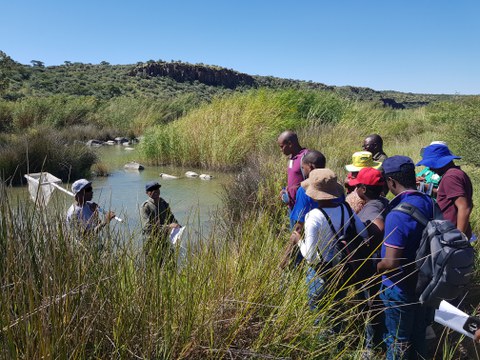African-German collaboration
Pesticide contamination of surface waters in Tanzania
In the United Republic of Tanzania awareness of pesticide risk for human health and the environment is low and small-scaled farming dominates the rural area with lack of knowledge on the safe use of such chemicals. As a result, hazardous pesticides accumulate in aquatic as well as terrestrial wildlife and trigger negative impact to humans through accumulation in the food chain. The Technische Universität Dresden (TUD, Dresden, Germany), the Tropical Pesticides Research Institute (TPRI, Arusha, Tanzania) and the University of the Free State (UFS, Qwaqwa, South Africa) collaborate to develop monitoring strategies for Lake Burunge and Lake Manyara. Funded by the TUD Internationalisation Strategy, workshops and sampling will be performed to inform and raise awareness, to promote dialogue and a network between stakeholders as well as to plan future research activities in the region.
Online workshop
A total of 28 professionals registered to participate in an online workshop on 11.08.2020 via the online conference application BigBlueButton. The workshop schedule included presentations from TPRI, UFS and TUD on the topics of environmental pesticide concentrations in Tanzania, implications from land use for the aquatic environment, biological endpoints for effect monitoring and the stakeholder context of water quality. The workshop was successful in connecting professionals from various backgrounds and communicating important information and ideas concerning future research activities of this collaboration.
On-site workshop
For 2021 an offline workshop in Arusha, Tanzania, is in the planning process in combination with sampling at Lake Manyara and Lake Burunge. Besides project partners, the focus will be on involving community members in the process. Previous studies at Lake Victoria in Uganda, Kenya and Tanzania have already indicated contamination of surface water associated with farming activities. However, there are inadequate studies conducted on Lake Burunge and Lake Manyara which are famous for fishing activities and the tourism sector, but surrounded partly by agriculture and national parks. Preventing a further deterioration of water quality requires a thorough analysis of the status quo and the involvement of all stakeholders to identify causes and derive effective measures.
Update: the project has been put on hold due to the ongoing COVID-19 pandemic.

Study region of the research collaboration: Lake Manyara and Lake Burunge nearby Arusha, Tanzania.
Contact
Feel free to contact us if you would like to contribute to this project!
| Dr. Dirk Jungmann | Technische Universität Dresden, Germany | dirk.jungmann@tu-dresden.de |
| Jessica Rosolowski | Technische Universität Dresden, Germany | jessica_magdalena.rosolowski@tu-dresden.de |
| Raphael J. Mwezi | Tropical Pesticides Research Institute, Tanzania | rafamwezyyy@gmail.com raphael.mwezi@tpri.go.tz |
| Dr. Patricks V. Otomo | University of the Free State, South Africa | OtomoPV@ufs.ac.za |


